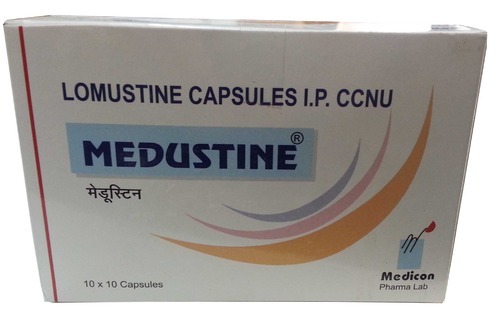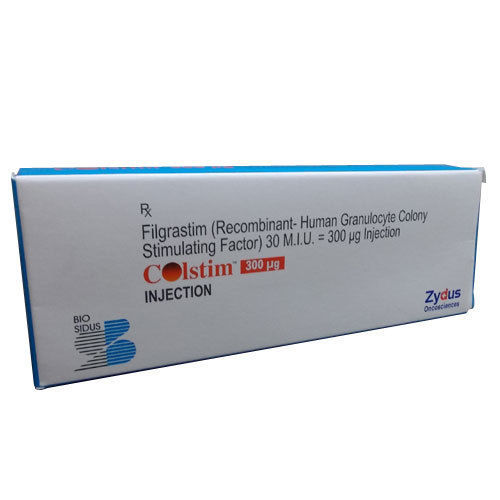
Medustine ( Lomustine Capsules)
Product Details:
- Origin India
- Dosage Form Capsules
- Indication brain tumours and Hodgkin's lymphoma
- Salt Composition Lomustine
- Feature Other
- Ingredients Other
- Application Other
- Click to view more
Medustine ( Lomustine Capsules) Price And Quantity
- 1000 Piece
- 1768.31 INR/Piece
Medustine ( Lomustine Capsules) Product Specifications
- Cool and dry place
- Other
- Lomustine
- Other
- Other
- India
- Capsules
- brain tumours and Hodgkin's lymphoma
- Normal Smell
- 12 Months
Medustine ( Lomustine Capsules) Trade Information
- Days after Acceptance (DA), Cash in Advance (CID), Cheque, Cash Advance (CA)
- North America, Eastern Europe, Middle East, Africa, Central America, Australia, South America, Western Europe, Asia
- All India
Product Description
Cancer chemotherapy uses the drug medustine (Lomustine Capsules). It contains the active component lomustine, an alkylating agent that inhibits the growth and proliferation of cancer cells by harming their DNA. Glioblastoma and brain metastases from other cancers are among the forms of brain tumours that medustine is approved to treat. The oral capsules are normally given by a medical expert with oncology experience. Low blood cell counts, nausea, and vomiting are examples of typical adverse effects. Specific brain tumours can be effectively treated with Medustine (Lomustine Capsules), providing possible advantages and better results for people with these disorders. Individual responses to the medicine, however, may differ, necessitating constant medical supervision throughout the course of treatment.
Medustine (Lomustine Capsules) Characteristics:
1. Lomustine, an alkylating agent well-known for its efficiency in cancer treatment, is the active ingredient in the capsules.
2. Cancer Treatment: Glioblastoma and other brain metastases from different malignancies are among the specific forms of brain tumours for which medustine is appropriate.
3. Oral Administration: The capsules are consumed orally, making for a quick and painless way to deliver medication.
4. Lomustine is an alkylating agent that inhibits the growth and division of cancer cells by altering their DNA.
5. Treatment Plan: The medicine is prescribed and dosed according to each patients unique medical situation, offering a treatment plan that is particular to them.
Medustine (Lomustine Capsules) Advantages:
1. Effective Brain Tumour Management: Medustine has proven to be effective in treating some forms of brain tumours, perhaps providing advantages and bettering patient outcomes.
2. Prolonged Progression-Free Periods: Patients with brain tumours treated with Medustine may experience longer progression-free intervals and higher survival rates.
3. Adjunct to Other Treatments: For more thorough management of brain tumours, medustine may be administered in addition to other therapies such surgery or radiation therapy.
4. Increased Quality of Life: Medustine can improve a patients overall quality of life by reducing symptoms and suppressing tumour growth.
5. Brain metastases can be effectively managed with medustine, which may also enhance disease control and provide some palliative relief.
6. Possibility of Long-Term Remission: Medustine therapy may occasionally result in long-term remission or stable illness, giving patients a protracted period without tumour growth.
7. Alternative Treatment Option: Medustine may be used in place of or in conjunction with existing treatments for individuals with particular types of brain tumours, offering more therapeutic options.
It is very important to keep in mind that every person will react differently to Medustine (Lomustine Capsules), and that close medical supervision and monitoring are necessary to manage any potential side effects and maximise treatment results. Throughout the course of treatment, patients should speak with their medical specialists for personalised counsel and direction.
Targeted Therapy for Complex Cancers
Medustine is specifically formulated to treat serious conditions such as brain tumors and Hodgkins lymphoma. Its effectiveness has made it a preferred choice among healthcare professionals for comprehensive cancer management. By targeting malignant cells, lomustine offers patients a tailored approach to therapy with potential benefits in controlling aggressive cancer forms.
Reliability and Quality from India
Manufactured in India, Medustine stands for reliability, stringent quality control, and consistency. The products 12-month shelf life, along with its requirement to be stored in a cool, dry environment, ensures maintained potency. As a trusted exporter, supplier, trader, and wholesaler, Medustine is distributed across various markets adhering to international standards.
FAQs of Medustine ( Lomustine Capsules):
Q: How should Medustine capsules be stored to ensure their effectiveness?
A: Medustine capsules must be stored in a cool and dry place, away from direct sunlight and humidity, to preserve their potency and stability throughout their 12-month shelf life.Q: What is the primary use of Medustine (Lomustine Capsules)?
A: Medustine is primarily indicated for the treatment of brain tumors and Hodgkins disease, helping inhibit the growth of cancerous cells under the supervision of a healthcare provider.Q: When should Medustine be taken, and what is the recommended dosage process?
A: Medustine should be taken orally as per your doctors prescribed dosage schedule. Always follow medical advice on timing and dosage to achieve optimal therapeutic effects.Q: Where is Medustine manufactured and who supplies it?
A: Medustine is manufactured in India and is available for export, wholesale, supply, and trade through authorized channels, ensuring genuine and high-quality medication distribution.Q: What are the ingredients in Medustine capsules?
A: The primary active ingredient is lomustine, complemented by other approved excipients to ensure capsule stability and patient safety.Q: Is a fermentation smell normal when using Medustine, and does it affect efficacy?
A: A normal fermentation odor might be noticed, which does not indicate spoilage or reduced effectivenessits a standard characteristic of the product formulation.Q: What benefits does Medustine offer in cancer treatment?
A: Medustine targets and inhibits malignant cells, offering a significant benefit in managing the progression of brain tumors and Hodgkins disease when used as directed by healthcare professionals.
Price:
- 50
- 100
- 200
- 250
- 500
- 1000+







